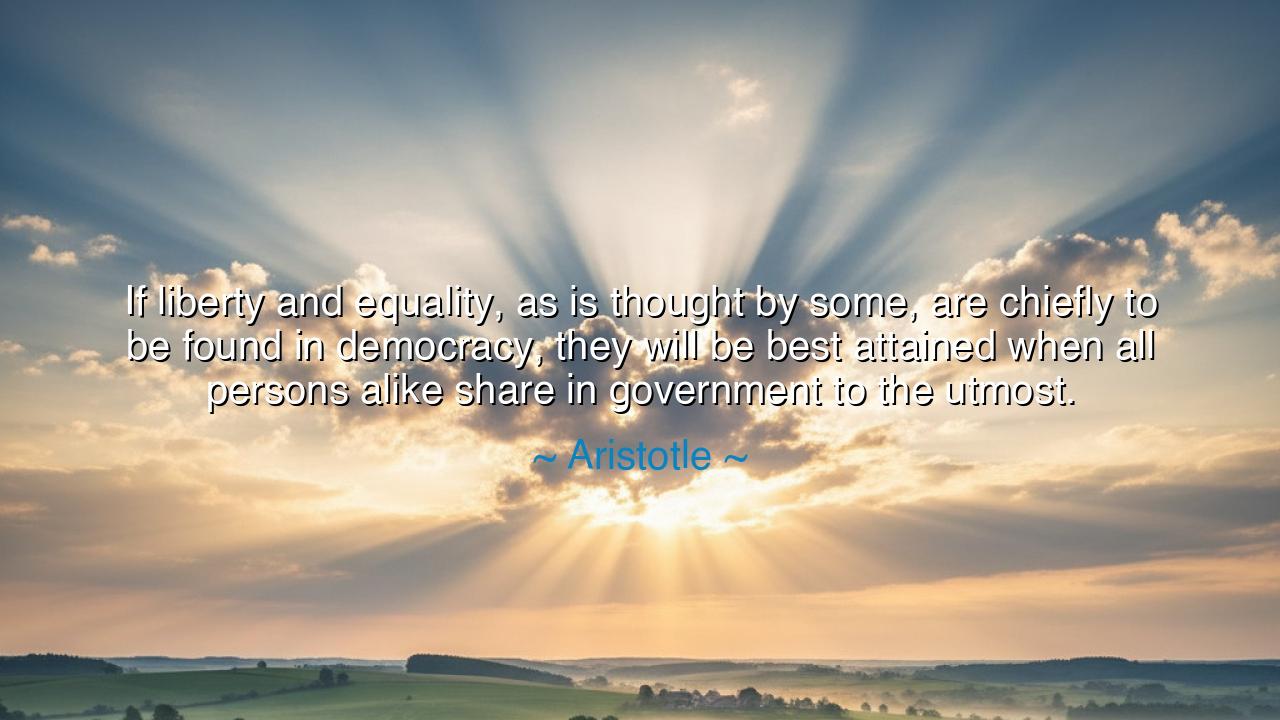
If liberty and equality, as is thought by some, are chiefly to be
If liberty and equality, as is thought by some, are chiefly to be found in democracy, they will be best attained when all persons alike share in government to the utmost.






The great philosopher Aristotle, whose wisdom shaped the very foundations of Western civilization, once declared: “If liberty and equality, as is thought by some, are chiefly to be found in democracy, they will be best attained when all persons alike share in government to the utmost.” In these timeless words, he reveals a truth that transcends centuries — that freedom and equality are not gifts bestowed by rulers, but the living breath of a people who take part in the shaping of their own destiny. For Aristotle, democracy was not merely a form of government; it was a moral practice, a discipline of shared responsibility, where each citizen holds within himself a spark of sovereignty.
To grasp the meaning of this quote, one must understand Aristotle’s vision of the polis, the ancient city-state. He believed that the purpose of government was not simply to maintain order or collect taxes, but to cultivate virtue in its citizens. Liberty and equality, he taught, were not abstractions to be admired from afar, but conditions of life that could only exist when all people participate in governance — when they share the burdens of decision and the glory of action. In his eyes, a citizen who abstains from the affairs of the state is like a musician who refuses to play: he weakens the harmony of the whole. Thus, liberty is not passive; it is participation — the art of shaping justice with one’s own hands.
The origin of these words lies in the heart of Aristotle’s political philosophy, as recorded in his work Politics. Living in the 4th century BCE, he witnessed the rise and fall of Greek city-states, each experimenting with monarchy, oligarchy, and democracy. From this experience, he concluded that no form of government could endure unless it reflected the active virtue of its people. If democracy was to mean more than mob rule, it had to be guided by wisdom, moderation, and shared power. To him, the balance of liberty and equality could only survive when all citizens — not merely the wealthy or the eloquent — took part in governing to the utmost. For only then could freedom remain rooted in justice, and equality grounded in respect.
History has proven Aristotle’s insight again and again. Consider the American Revolution, two thousand years after his death. The colonists, once ruled by distant kings, rose to demand a government where every citizen might have a voice. They risked their lives not merely to change rulers, but to reclaim participation in the shaping of their fate. Their republic, though imperfect, was built upon the same eternal foundation that Aristotle described — that liberty and equality exist only when power belongs to the people. When government becomes the exclusive domain of a few, tyranny creeps in; when it becomes the shared duty of all, freedom endures.
Yet Aristotle’s teaching is not confined to history. In every age, there are those who forget that democracy requires more than voting — it demands vigilance, dialogue, and moral courage. A society that ceases to care, that leaves politics to the ambitious or the corrupt, is already surrendering its liberty. When the people no longer “share in government to the utmost,” they create the conditions for their own chains. True equality is not achieved by decree or law, but by engagement — by citizens who speak, serve, and act with conscience. The health of any democracy, Aristotle reminds us, depends upon the virtue of its citizens, not merely the structure of its institutions.
The lesson of his words is therefore both eternal and urgent: freedom dies not through conquest, but through neglect. Each generation must renew the practice of democracy — not as a right alone, but as a sacred duty. To share in government means to bear its burdens with integrity, to seek truth over comfort, and to serve the common good above personal gain. Equality, likewise, is not the sameness of condition, but the recognition that every voice matters, every life contributes, and every citizen is part of the whole.
And so, my children, remember the wisdom of the ancients: if you desire liberty and equality, you must take part in the work of governance. Speak with reason, vote with conscience, and act with honor. Let no one convince you that your voice is too small or your effort too weak. For the strength of a nation does not lie in its rulers, but in its people — in their willingness to participate “to the utmost.” When all hearts rise in this shared labor, liberty will not be a fragile dream, but a living flame — sustained by the hands of all who cherish it.






AAdministratorAdministrator
Welcome, honored guests. Please leave a comment, we will respond soon